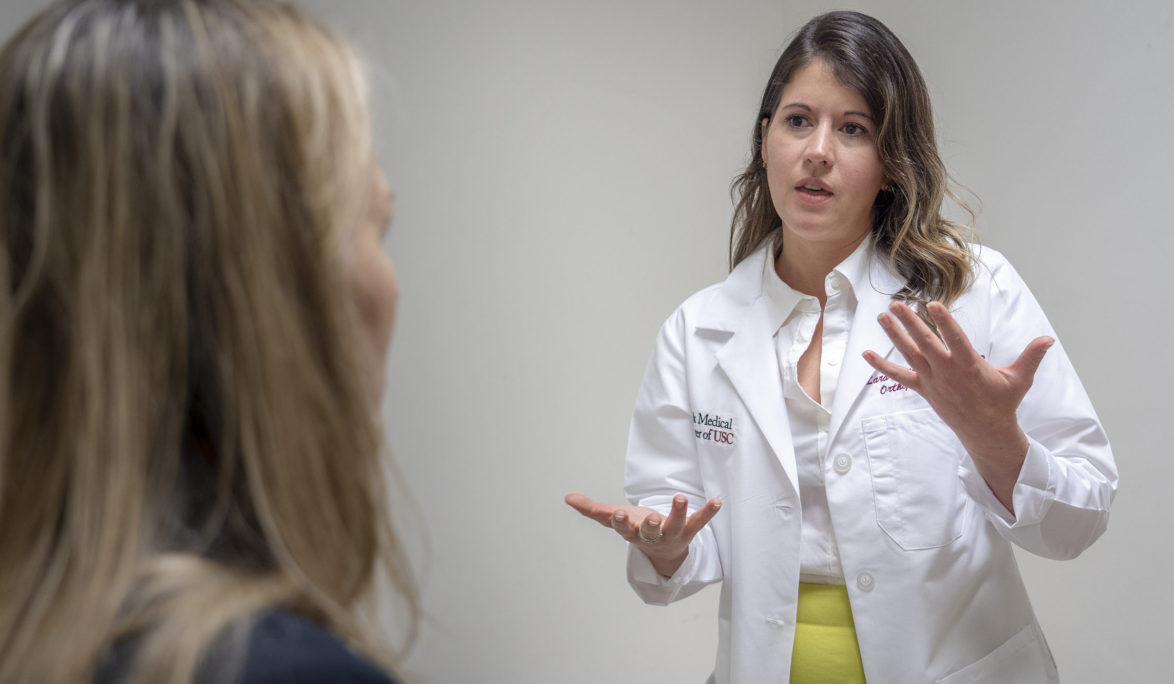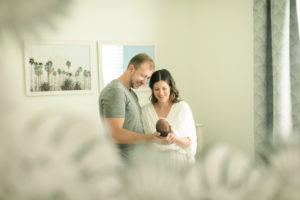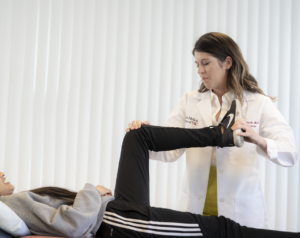
It is no secret that pregnancy comes with a host of changes for your body. These changes allow you to accommodate making a new life but also can put you at risk for musculoskeletal issues along the way. This is often because of some combination of loosening of ligaments due to hormones, changes in the center of gravity due to your new “bump”, added weight in general, and increases in overall body stress.
Most common Issues I see in practice:
#1 Injuries from a Fall:
As a specialist, I usually see a patient when they hurt something that needs further investigation. Injuries happen to even the healthiest of pregnant patients. One of the most common I see is an ankle sprain (see my full post here on all things ankle sprains) Pregnant patients often feel unbalanced. A movement as simple as stepping off a curb awkwardly can lead to an ankle injury. The great news is the treatment for ankle sprains during pregnancy is very similar to the average patient, and most do very well without long term issues.
Another common injury from a fall is a broken kneecap (patella). Again, these tend to happen because of being a little off balance. With a slip or fall, you can land directly on the knee causing the patella to break. This is painful! The injury is not usually subtle and makes it difficult to stand or walk. X-rays will show us the problem, and sometimes the problem needs to have surgery to fix, but often you can get better with a period of resting your leg in a straight position. Though keeping your leg fully straight for weeks is not easy while pregnant… something I appreciate even more now that I am pregnant! But my patients have made it through, and you will too!
Other broken bones can also happen during pregnancy from falls. The second most common fracture in my practice is a broken wrist. When you start to fall you naturally reach for the ground to brace yourself. Unfortunately with this motion, you can land on your outstretched hand break a bone in your wrist called the distal radius. Again, sometimes these need to be fixed with surgery. The ones that do not are treated in a cast for several weeks. Being in a wrist cast while pregnant also seems absolutely no fun, but it is achievable and safe. Keep in mind these things can happen in pregnancy (just like outside of it), and orthopedic doctors are trained to do what is best to make sure your bones heal well, and your pregnancy stays safe. It is key to let your OB know if you have had a fall or are seeking care with another doctor. This allows us to all work together to be sure we are optimally treating you and keeping everything as pregnancy safe as possible.
#2 Aches and Pains
Ah yes, the joys of pregnancy… Sometimes if feels like everything hurts whether you move or sit still! Joint pains, achy muscles, and stiffness all over are very common. Muscle imbalance mixed with a growing belly often leads to a very common complaint, back pain. It is estimated that 50-80% of patients experience back pain during pregnancy (2). Other super common areas of pain are the hips/pelvic girdle, knee, and neck. Most of this can again be attributed to the normal changes that occur during pregnancy, and keeping active throughout is the absolute best way to keep these issues at bay.
#3 Wrist and Hand issues
Again attributed to the changes of pregnancy, wrist and hand pain is also very common. One specific condition that plagues pregnant patients is carpal tunnel syndrome. This condition usually experienced as hand numbness and tingling in the thumb, index and middle fingers and has been estimated to occur in up to 62% of women who are pregnant (1). Great news, this most often resolves on its own after delivery. Until then, stretches and braces for the wrist usually help relieve the symptoms.
How to stay safe:
First and foremost, listen to your body! The changes of pregnancy alter so much about your function and physiology. You should avoid risky activities where falling could occur, be careful on wet ground and ice, and always be extra vigilant of where you are walking. Stepping off a curb requires attention as does hurrying across a street or walking on a dirt road/path. Be careful!
Another great tool is a daily body “check in” to see how you are feeling. Is your back tighter today? How do those hips feel? If you can catch an ache or pain early before it becomes severe, you can likely fix it faster. Add in stretches or targeted exercises for your problem areas, and keep moving throughout pregnancy. Another tip is to remember to take a break if you are sitting for a prolonged period. This helps keep your body from becoming stiff. It is important to avoid heavy lifting, and be sure you are using proper techniques to lift with your legs (not your back) to stave off further back pains and injuries. Avoid reaching far away from your body as much as possible to keep your center of gravity stable. Sadly, since your balance is a little off, retiring your high heels short term is the safest thing to do.
As always on this website I preach an overall healthy, active lifestyle. In pregnancy this doesn’t change! If anything, it means more focus on these techniques to keep you fit as everything changes. Daily stretching, strengthening, and cardiovascular exercise help keep your body healthy and strong all pregnancy long. This helps you avoid injuries, keeps a better mind-body connection to avoid falls, and keeps aches and pains away.
Finally, what to do if you have pain or get hurt:
First, think about the severity (how bad is it?). If on your daily body check you noticed some general soreness and aches and pains, start with easy-to-do changes at home. Sit in a more proper position while working, remember to take standing breaks, and be sure you are getting proper exercise and stretching. Always keep in mind your daily routine and that you may need to change something if your body is aggravated by these activities. Also, as always, talk to your OB! Bring up these concerns at appointments or even before if you feel they are significant. Many small aches and pains are common and not a big deal, but you should always discuss with your doctor to be sure something further doesn’t need to be evaluated. Also know that even for general aches and pains, sometimes braces or other supports can be used to ease the discomfort. Sometimes your doctor may recommend a pregnancy-safe medication such as Tylenol or even refer you to physical therapy to aid in your recovery.
If you have a larger amount of pain related muscle or joints or if you have had a sudden injury, an urgent/emergency evaluation is the way to go. You should also absolutely reach out to your OB as they can work with your orthopedic team to be sure you are optimally treated as a whole by coordinating specific recommendations based on pregnancy. If you need an X-ray, don’t panic. You can use a shield, and the doctor will do everything possible to keep you safe by only taking x-rays that are necessary to treat you properly. Trust your doctor, and ask questions along the way. I never feel bad when a pregnant patient asks about the necessity of a test or treatment.
Sources:
1. https://pubmed.ncbi.nlm.nih.gov/19753825/






No comment yet, add your voice below!